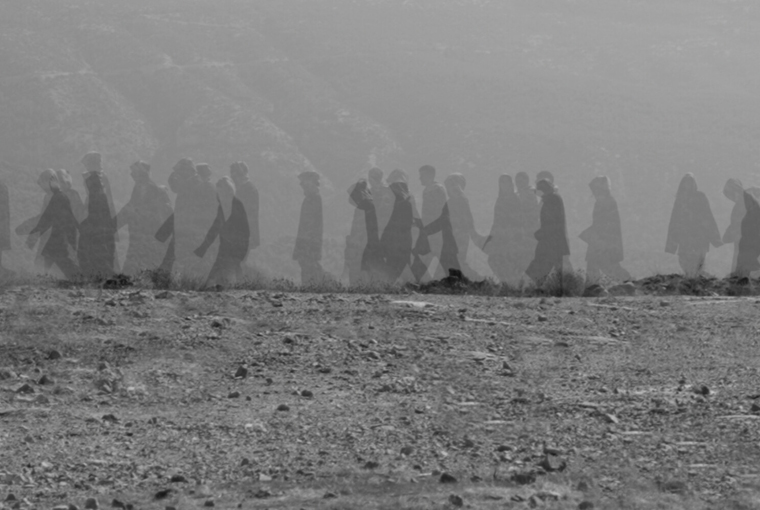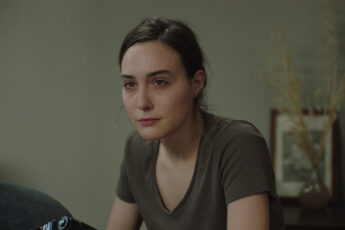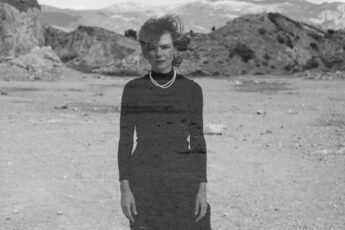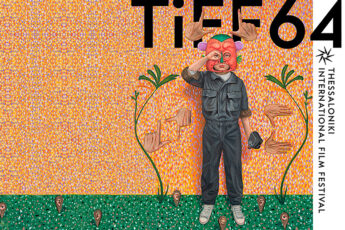
Under Communist regimes, culture often turned inward due to the pervasive nature of the state and the ideological constraints imposed on cultural expression. The state’s omnipresence meant that few topics were addressed without reference to the system itself. This inward turn also stemmed from the interest in and critique of the system, which at times was more engaging than the cultural products it sought to promote. It allowed artists to express dissent and to reflect on the contradictions of Socialist life.
Some of the most memorable films of Socialist Europe, such as Jan Němec’s A Report on the Party and the Guests (1966), Krzysztof Zanussi’s Camouflage (1977), or Eldar Shengelaia’s Blue Mountain (1984), are poignant reflections on the inherent contradictions of the political systems they were made under. Each of these films use a social microcosm – be it a banquet, university, or publishing house – to scrutinize and critique the absurdities of the broader political macrocosm that is characterized by corruption, oppression, and forced conformity.
The many scandals surrounding this year’s Berlinale read like a script from such a film. They may be a sign that the cultural elites are increasingly becoming focal points of interest, sometimes even overshadowing the artistic works they produce. Reporting on the festival opening, the German magazine Der Spiegel ran the headline, “By the way, there’re also films”.
A week before the 2024 edition opened, the Berlinale co-directors, Mariëtte Rissenbeek and Carlo Chatrian, made the decision to disinvite members of the far-right Alternative für Deutschland (AfD) party from the festival’s opening gala. This decision was taken in response to recent revelations about the party’s inhumane positions and discussions involving the AfD about plans for mass deportations of people with a non-German ethnic background, including German citizens. The organizers emphasized that the festival’s commitment to freedom, tolerance, and democratic values was fundamentally incompatible with the AfD’s ideology. The disinvitation sparked a broader discussion about the role of cultural institutions amidst a political climate increasingly leaning toward far-right ideologies. So it was no surprise that several questions during the Jury Q&A were devoted to the topic. Among them, the following:
Melanie Goodfellow: Melanie Goodfellow from Deadline. Now this is a political festival, so I’m sorry to go back to you Christian [Petzold] and also Lupita [Nyong’o] about the issue of the AfD. Lupita I want to ask you: would you have come to the opening night if AfD members had been in the auditorium given that AfD has plotted plans to deport people, non-white people, living in this country. Would you have been able to be in the same room as them. I’m sorry to ask this question but it’s a really important question. And Christian, you said okay, it’s good to have those members in the auditorium and I don’t disagree with you, but after Lupita, could you sort of explain why you think it’s okay to have those people in the auditorium. Thank you.
Christian Petzold: I think, I, oh, I’m sorry, you [Lupita] are the president, not the elected one, but you are the president! I’m sorry, because [pointing at himself], yeah, do you want to ask, yeah…
Lupita Nyong’o: I mean she asked a question, I guess I should answer it. I’m a foreigner here. I don’t know the ins and outs of the political situation here. I’m glad I don’t have to answer that question. I’m glad I don’t have to be in that position.
Christian Petzold: […] I think all these questions make them stronger than they are. So we’ve been discussing for many days about five people in the audience and we are talking about the AfD and I think there are hundred thousands of people demonstrating against them and they are much more important than these kinds of discussions.
This brief interaction is revealing in many respects. First, there is Melanie Goodfellow’s question to Lupita Nyong’o, a Kenyan-Mexican actress, which shifts the responsibility of responding to Germany’s far-right surge onto a black foreigner. Perhaps feeling that the question is misplaced, the journalist finds a reason for her inquiry – that the festival is political. How so? The framing of the question not only shifts the burden of confronting racism onto Nyong’o, but also assumes that her presence should naturally involve her in discussions on racism simply because of the color of her skin. If this reasoning is political, then it is also violent. It mirrors the colonial mindset of dominating a population while delegating the task of addressing the colony’s ills back onto those considered to represent the colonized.
Second, there is German filmmaker Christian Petzold’s Freudian slip, in which he refers to Nyong’o as not having been elected to be president. Aside from undercutting her authority and legitimacy in that space, the slip addresses the hierarchical nature of film festivals, which often mirror feudal structures in organization and power dynamics. But while a debate on the organizational structure of film festivals may be useful, it is as misplaced here as the journalist’s comment, and again forces a major political problem onto the ‘Other’.
Third, there is Petzold’s final point that discussions about the presence of far-right elements within influential cultural spaces only validate their views. This comment overlooks the importance of cultural platforms as spaces of influence. Historically, looking away or failing to confront far-right extremism, has not effectively curbed these movements. As Larry M. Bartels argues in his recent book, established democracies are not as secure as one might assume, and their erosion often begins subtly and from the highest levels of power. This erosion includes ignoring or rationalizing small violations of democratic norms that can, over time, lead to a significant dismantling of democratic structures.
The hypocrisy in both the journalist’s question and the filmmaker’s answer is so blatant that one can but admire Nyong’o’s composed reply. The exchange reflects the atmosphere at a festival that claims to champion democracy, tolerance, and political engagement, yet is not immune to forms of systemic racism, albeit ones that are subtler and socially more acceptable than those espoused by the AfD. In that light, disinviting the AfD puts the nail in the coffin of hypocrisy. It enables the Berlinale to take a stand against extremism without addressing the more ingrained prejudices and power imbalances that persist within its own structures and within broader society. Such scapegoating conveniently places a systemic problem onto an external threat, thus avoiding self-examination and change.
The next episode came at the festival’s closing ceremony, when Basel Adra, a Palestinian filmmaker, and Yuval Abraham, an Israeli journalist, jointly accepted the best documentary award for their film No Other Land. Their film examines the destruction of Palestinian villages in the West Bank. During their acceptance speeches, Adra commented on the violence in Gaza, urging Germany to stop arms exports to Israel, while Abraham criticized the apartheid conditions affecting Palestinians living near him in Israel. Abraham concluded with a call for a ceasefire in Gaza and a political solution to end the occupation. This led to a political uproar, with Berlin’s mayor Kai Wegner (CDU) speaking of an “untenable relativization”. Claudia Roth, Germany’s minister of state for culture and the media, was seen applauding after their speeches. Later it was stated by Roth’s office that her applause was specifically meant for Yuval Abraham’s call for peace and coexistence, not for his Palestinian colleague.
Roth’s selective applause and subsequent statements epitomize the problematic way Germany handles such issues. Her reactions reveal a method of dismissing criticisms by conflating them with anti-Semitism. This tactic not only deflects from the substance of the critique but also perpetuates a cycle where accusations of anti-Semitism are used to silence dissent, thereby overshadowing genuine human rights concerns. The promised public “examination” of the situation by Roth feels more like a bureaucratic maneuver to formally control what is allowed to be said in public discourse. It reflects a perverse stance in Germany’s public policy, where historical guilt over past atrocities leads to a paradoxical tolerance of ongoing injustices under the guise of upholding moral obligations.
Such hypocrisies might not go unnoticed by voters and supporters of the AfD, who could view them as symptomatic of a broader elitist attitude in cultural institutions that claims to champion inclusivity and democracy while itself practicing different forms of selective exclusion. Such perceptions can exacerbate feelings of disenfranchisement among these groups of voters, who may then retaliate against what they see as an undemocratic and corrupted cultural elite by withdrawing support, advocating against funding, or even engaging in acts of vandalism or censorship against art deemed elitist or hypocritical. Historically, both under Communist regimes and in fascist contexts, similar dynamics have led to the suppression, banning, or destruction of art.
If a film about the Berlinale is in order, one may hope that it will feature its new sponsorship deal with Uber. Given the company’s contentious legal history in Berlin, this strategic partnership might well serve as a scene straight out of a dystopian satire, leaving even the most candid festivalgoer questioning whether every cultural institution, no matter how revered, is doomed to succumb to the cynicisms of reality.
***
This month’s issue features coverage produced at several film events during the past few weeks and months. From the 2023 Ji.hlava International Documentary Film Festival, Martin Kudláč reports with articles on Petr Jančárek’s Havel Speaking, Can You Hear Me? about the post-presidential life of former Czech president Václav Havel, and on Ilinca Calugareanu’s A Cautionary Tale, a documentary about the absurdity of bureaucracy that modulates into a reflection on the epistemic reliance of filmmakers on their subjects. At the 2023 Thessaloniki Film Festival, Margarita Kirilkina caught Gentian Koçi’s A Cup of Coffee and New Shoes On, a portrait of two deaf-mute twin brothers who are plunged into blindness, and Karolos Zonaras’ meditative and allegorical Tranzit that takes place in a transitional space between the material world and the bodiless realm. Zoe Aiano reviewed Heaven and Home, an essayistic reflection on displacement by our friend and contributor Daniil Lebedev, at DOK Leipzig. Finally, we are publishing a discussion of Anna Hints’ Smoke Sauna Sisterhood that screened at this year’s Trieste Film Festival. The article, co-authored by Ana Grgić and Antonis Lagarias, points to the empowering potential of safe spaces in a world ruled by men.
We hope you enjoy our reads.
Konstanty Kuzma & Moritz Pfeifer
Editors




Leave a Comment